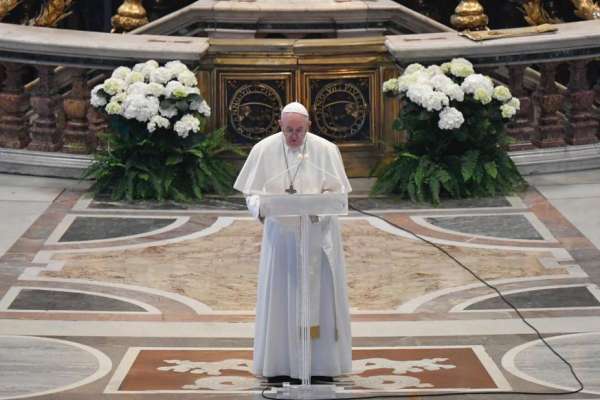Pope Francis moves to the march of financial reform in the Vatican

Perhaps there is no single reform project, but an honored propeller for change is often the intersection of scandal and necessity. This certainly seems to be the case of Pope Francis in the Vatican regarding finances, where in no time since 2013-14 have the reforms been started as quickly and furiously as at this moment.
The difference is that seven years ago, the flurry of activity mainly concerned new laws and structures. Today it is more about application and application, which is increasingly complicated, because it means that specific people could lose jobs or power and, in some cases, could face criminal charges.
The latest of these developments came on Tuesday, when the Vatican announced that following a raid on the offices of the Fabbrica di San Pietro, the office that administers St. Peter's Basilica, the pope appointed the Italian archbishop Mario Giordana , a former papal ambassador to Haiti and Slovakia, as "extraordinary commissioner" of the factory with the task of "updating his statutes, shedding light on his administration and reorganizing his administrative and technical offices".
According to reports from the Italian press, the move comes after repeated internal complaints of the factory for irregularities in contracts, raising suspicions of favoritism. The 78-year-old Giordana, according to the Vatican statement on Tuesday, will be assisted by a commission.
Despite the general stalemate linked to the coronavirus in recent months, it was a driving period in terms of a financial reshuffle in the Vatican, with Tuesday's shake only the last chapter.
Italy suffered a national freeze on March 8 and since then Pope Francis has taken the following measures:
The Italian banker and economist Giuseppe Schlitzer was appointed on 15 April as the new director of the Vatican's Financial Intelligence Authority, his financial supervisory unit, after the abrupt departure of Swiss anti-money laundering expert René Brülhart last November.
On May 1, five dismissed Vatican employees were believed to be involved in a controversial purchase of a piece of property in London by the Secretariat of State, which took place in two phases between 2013 and 2018.
He convened a meeting of all department heads to discuss the Vatican's financial situation and possible reforms in early May, with a detailed report by the Jesuit father Juan Antonio Guerrero Alves, appointed by Francis last November as prefect of the Secretariat for the 'economy.
It closed nine holding companies in mid-May based in the Swiss cities of Lausanne, Geneva and Friborg, all created to manage parts of the Vatican's investment portfolio and its real estate and real estate properties.
Transfer of the Vatican's "Data Processing Center", basically its financial monitoring service, from the Administration of the Patrimony of the Apostolic See (APSA) to the Secretariat for Economic Affairs, in an attempt to create a stronger distinction between administration and control.
It issued a new procurement law on June 1, which applies both to the Roman Curia, or to the bureaucracy that governs the universal church, and to the Vatican City State. It blocks conflicts of interest, imposes competitive bidding procedures and centralizes control over contracts.
Appointed Italian layman Fabio Gasperini, ex banking expert for Ernst and Young, as new official number two of the Administration of the Patrimony of the Holy See, in effect the Vatican's central bank.
What is driving this burst of activity?
First, there is London.
The ongoing scandal was a huge embarrassment, among other things questioning the effectiveness of the pope's reform efforts. It is particularly worrying since presumably, at some point this year, the Vatican will face the next round of review by Moneyval, the Council of Europe's anti-money laundering agency, and if the agency decides the London debacle, it means that the Vatican is not serious about compliance with international standards of transparency and accountability, it could be blocked by currency markets and face significantly higher transaction costs.
For another, there is coronavirus.
The analysis presented to the pope and the heads of departments by Guerreo suggests that the Vatican's deficit could increase by up to 175% this year, reaching nearly $ 160 million, due to the drop in income from investments and real estate, as well as the reduction contributions from dioceses around the world as they struggle with their financial problems.
This deficit adds to several long-term structural weaknesses in the Vatican's financial situation, especially an impending pension crisis. Basically, the Vatican has too many staff and struggles only to face wages, let alone putting aside the funds that will be needed as today's workforce begins to reach retirement age.
In other words, a complete financial house cleaning is no longer simply a moral desire, or an impetus for public relations to avoid future public scandals. It is a matter of survival, which almost always has the effect of clarifying thought and giving a sense of urgency.
It remains to be seen how effective these new measures will be. First, it will be important to see if the factory review follows the same script as many other Vatican investigations on financial scandals, which is to identify a handful of Italian lay people, external consultants or direct employees, and to blame everyone on them. thus isolating the cardinals and the elderly clergy from guilt.
However, six months ago it was tempting to conclude that Pope Francis had given up on financial reform. Today, given the double sense of scandal and debt, it seems decidedly serious.